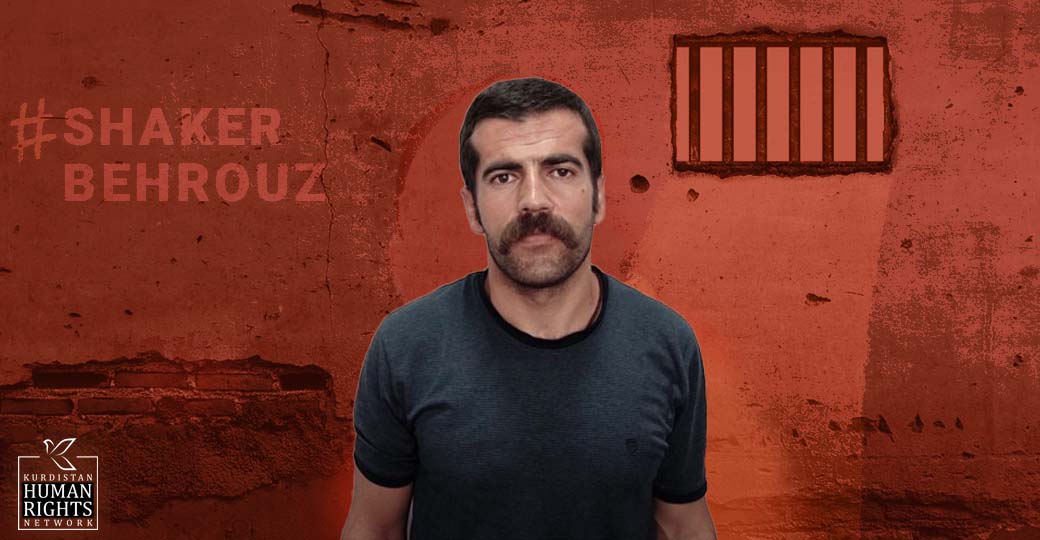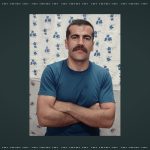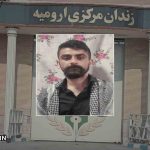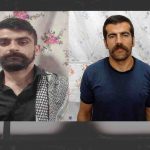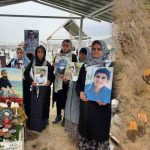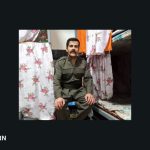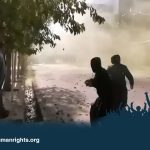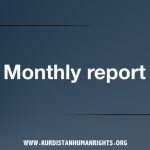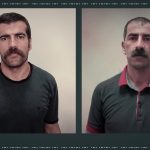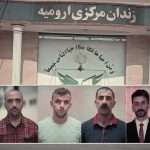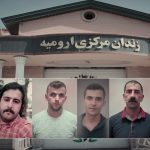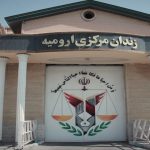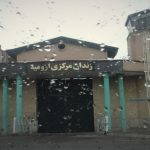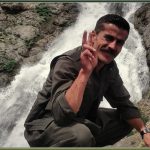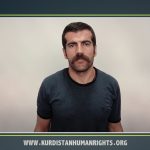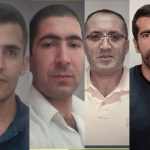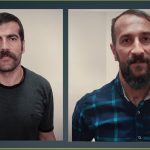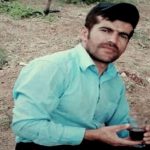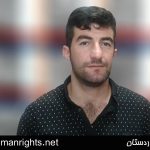Shaker Behrouz left the Democratic Party of Iranian Kurdistan (PDKI) in autumn 2018 after being a member for a few months, and returned from the Kurdistan Region of Iraq to Iran after receiving a “safe conduct” letter.
Upon appearing at the Ministry of Intelligence Office in Orumiyeh, West Azerbaijan Province, he was detained and held for two weeks for interrogation before being released.
In December of the same year, he was sentenced by Branch 114 of Orumiyeh’s Second General Court to two months’ imprisonment, suspended for a year, on charges of “illegally crossing the country’s borders”.
Arrest
Behrouz was arrested in by the Intelligence Protection Organisation of the Islamic Revolutionary Guard Corps (IRGC) in Orumiyeh on 17 February 2019, on charges of the “premeditated murder” of an IRGC member.
He was held for one year and 18 days in solitary confinement at the IRGC’s security detention centre in Al-Mahdi barracks, Orumiyeh, where he was subjected to severe torture to extract forced confessions.
Throughout this long period, Behrouz was denied contact with his family and to have access to a lawyer.
Judicial Proces
In July 2019, Behrouz was tried in Branch Two of the Islamic Revolutionary Court in Orumiyeh, presided over by Judge Sheikhlou, in a brief session that lasted only a few minutes.
He was convicted of “acting against national security” through his membership in the Democratic Party of Iranian Kurdistan (PDKI) and sentenced to five years in prison.
In September 2020, the IRGC fabricated new charges, and once again, the case was brought to Branch Two of the Islamic Revolutionary Court in Orumiyeh, where Judge Sheikhlou sentenced Behrouz to death for “armed insurrection” (baghi), accusing him of membership of the Komala Party of Iranian Kurdistan.
In July 2021, Branch 31 of the Supreme Court overturned this death sentence and referred the case back to Branch One of the Islamic Revolutionary Court in Orumiyeh for retrial. However, in July 2022, the court once again sentenced Behrouz to death.
On 6 December 2020, the political prisoner was sentenced to death by Branch One of the Juvenile Criminal Court of West Azerbaijan Province, presided over by Judge Latif Zareh, for the “premeditated murder” of an IRGC member. He was informed of the death sentence on 26 December 2020.
On 29 June 2022, Behrouz was transferred to solitary confinement in preparation for his execution.
The following morning, after extensive efforts by local elders and the community, the victim’s family appeared at Notary Office No. 84 in Silvaneh, Orumiyeh, and formally withdrew their complaint against Behrouz for the charge of “premeditated murder”, granting him full and unconditional clemency.
With the victim’s family’s pardon, the death sentence was annulled, and the case was referred to the Criminal Court of Orumiyeh for reconsideration of the general aspect of the crime, where Behrouz was sentenced to 10 years in prison.
Current Status
Behrouz is currently being held in Orumiyeh Central Prison.
Additional Information
On 13 June 2021, following a hunger strike to protest the court’s failure to consider evidence submitted in his defence and the issuing of the death sentence, Behrouz was transferred to solitary confinement and denied contact with his family.
On 21 September 2021, Behrouz, together with 42 other political and religious prisoners in Ward 10 of Ormiyeh Central Prison, refused to accept state-provided food to protest the prison’s classification committee’s refusal to transfer sick inmates to hospitals outside the prison.
On 21 November 2021, Behrouz began a hunger strike and held a sit-in outside the prison guard’s office to protest pressure from the IRGC on the victim’s family to prevent them from granting clemency. He ended his strike on the fourth day after prison officials and the supervising judge promised to address his requests.
On 12 December 2021, Behrouz, alongside 46 political and religious prisoners, protested against their transfer to a newly established high-security ward by refusing to accept state-provided meals. After a week, on 23 December, they ended their strike following assurances from prison officials that their demands would be addressed.
On 10 January 2022, Behrouz and other political and religious prisoners were transferred to Orumiyeh Central Prison’s high-security ward. Special Guard forces severely beat inmates who resisted the transfer and destroyed their personal belongings. Several prisoners, suffering serious injuries to the head, arms, and chest, were placed in solitary confinement instead of being taken to the prison infirmary.
On 29 March 2022, Behrouz was summoned to the guard’s office under the pretext of a family visit and transferred to Quarantine Block 2 of Orumiyeh Central Prison. He went on hunger strike in protest of this transfer and was sent to solitary confinement the next day.
Behrouz set fire to blankets in his solitary cell to protest his solitary confinement. Prison guards, in the presence of prison officials, took him from his cell, severely beat him with batons in front of other prisoners, and returned him to solitary confinement, despite his injuries.
He remained in solitary confinement for at least 14 days while still on hunger strike and was denied contact with his family.
On 29 June 2022, Behrouz was summoned to the guard’s office in the political and religious prisoners’ ward of Orumiyeh Central Prison under the pretext of a family visit and was transferred to an unknown location. In a brief phone call to his family before this sudden transfer, Behrouz informed them of the imminent risk of his execution. He was returned to the ward the next day after being held in solitary confinement.
On 18 April 2024, the political prisoner went on a hunger strike to protest the opening of a new judicial case against him and was transferred to solitary confinement by order of Orumiyeh Central Prison authorities. He ended his hunger strike on 22 April and was returned to the ward.
Notes:
1. A “safe conduct” letter is a document whereby individuals who have been members of opposition parties against the Islamic Republic of Iran are allowed to return to the country and resume their personal lives, provided they express remorse and receive approval from the Islamic Republic of Iran. Although the issuance of the “safe conduct” is based on the government’s commitment not to harm, prosecute, or punish its recipients, there have been numerous cases where individuals, after receiving the document and returning to the country, have faced threats, pressure, harassment, arrest, and punishment by the military, security, and judicial authorities of the Islamic Republic of Iran, and some have even been executed.
2. Article 35 of the Passport Law: “Any Iranian who enters or exits the country through unauthorized points shall be sentenced to imprisonment for a period of two months to one year, or fined.”
3. The Democratic Party of Iranian Kurdistan (PDKI) was founded on 16 August 1945, with the aim of gaining autonomy for Iranian Kurdistan. According to the party’s charter, this political organisation, grounded in the “nationalist ideas and organizational structure of the Society for Kurdish Resurrection (KJK) and with a realistic and contemporary approach”, emerged as a modern entity in the political arena. KJK was the founder of the Republic of Kurdistan (22 January 1946 – 15 December 1946) in Mahabad. The republic lasted only 11 months, ending with an attack by the Iranian army, which executed its leaders, including Qazi Muhammad, the party leader and President of Kurdistan.
PDKI went through a period of armed struggle in the late 1960s, marked by internal party disputes, and ultimately, re-emerged as a political party on the eve of the 1979 revolution. Two of its leaders, Abdul Rahman Ghassemlou and Sadegh Sharafkandi, were assassinated by the Islamic Republic of Iran in Europe in 1989 and 1992, respectively. In 2006, due to heightened internal conflicts, the party split into two factions: the Democratic Party of Iranian Kurdistan and the Kurdistan Democratic Party (HDK). These two factions eventually announced their reunification on 22 August 2022, after 15 years of separation.
The party has declared its ultimate goal as “the establishment of a democratic-socialist society” and its strategic slogan as “securing the rights of the Kurdish people in Iranian Kurdistan within the framework of a federal democratic system in Iran”. The main headquarters of the PDKI is in Erbil, Kurdistan Region of Iraq.
4. Articles 287 of the Islamic Penal Code: “A group that engages in armed insurrection against the foundation of the Islamic Republic of Iran is considered rebellious, and if they use weapons, the members shall be sentenced to the death penalty.”
5. Komala Party of Iranian Kurdistan: The Komala of Revolutionary Toilers of Iranian Kurdistan, known as Komala, a Marxist-Leninist organisation with Maoist inclinations, after nearly a decade of clandestine activities, publicly declared its establishment on 15 February 1979, simultaneously with the victory of the 1979 revolution.
In 1984, Komala and several other leftist Iranian groups founded the Communist Party of Iran (CPI), and Komala was renamed to Komala Kurdistan’s Organisation of the Communist Party of Iran.
In 2000, part of the party’s leadership and members, under a project entitled “Reviving Komala,” split from the CPI and reverted to their original name before the formation of the CPI; the Komala of Revolutionary Toilers of Iranian Kurdistan or Komala Party of Iranian Kurdistan.
The Komala Party of Iranian Kurdistan believes in social democracy and considers “establishing a federal government” the appropriate solution for the Kurdish issue in Iran. The central headquarters of this party is in Sulaymaniyah, Kurdistan Region of Iraq.

